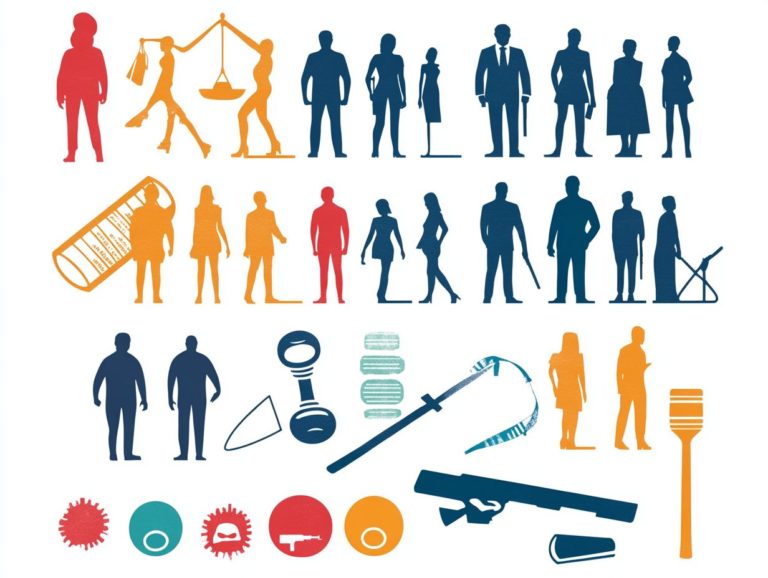5 Types of Sexual Offenses Explained
Understanding sexual offenses is vital. It helps raise awareness, prevent these crimes, and support victims effectively.
This discussion covers five key types of sexual offenses: sexual assault, rape, sexual abuse, sexual harassment, and statutory rape. Each section clarifies legal definitions, potential consequences, and resources available for those affected.
It also discusses ways to prevent these offenses and the long-lasting effects they can have on survivors. Join us as we navigate this important topic together.
Contents
Key Takeaways:
Sexual offenses include types like sexual assault, rape, abuse, harassment, and statutory rape. Each type has specific legal definitions and consequences. It’s crucial for survivors to seek help and support.
1. Sexual Assault
Sexual assault is a serious crime in Texas. It involves unwanted sexual contact and can cause deep emotional trauma.
In Texas, this includes rape and other non-consensual interactions. The consequences are severe and can lead to anxiety and depression for survivors.
The justice system aims to handle these cases sensitively, but survivors often face challenges. Support resources like hotlines and counseling are available to help.
2. Rape
Rape is one of the most serious forms of sexual violence. It is defined by non-consensual sexual intercourse and carries severe legal consequences in Texas.
This crime occurs when consent is absent, often due to factors like force or incapacitation. To secure a conviction, the act, lack of consent, and intent of the perpetrator must be established in court.
The penalties for rape can be life-changing, including long prison sentences and mandatory sex offender registration.
Recognizing the critical role of legal representation is key. Having a lawyer help you with the legal process can ensure that victims rights are upheld while providing a fair trial for the accused.
3. Sexual Abuse
Sexual abuse includes inappropriate behaviors directed at individuals, especially minors. It is a profound violation of trust and consent that leads to significant emotional trauma.
In Texas, sexual abuse covers actions like fondling and sexual assault. It is distinct from other sexual crimes like indecent exposure.
The impact of sexual abuse often extends beyond physical harm, resulting in long-lasting psychological effects like anxiety and depression.
Fortunately, victims have several legal options, including filing criminal charges and civil suits. Community organizations offer vital support, providing counseling and legal assistance that promote healing and resilience.
4. Sexual Harassment
Sexual harassment is a serious issue. It involves unwanted contact or advances that create a hostile environment. This behavior can take many forms, including inappropriate comments, suggestive gestures, or even physical assaults.
All these actions fall under specific legal definitions established in Texas law. The law gives you the right to a safe environment and provides pathways for reporting violations and seeking justice.
The emotional impact on victims is profound. They often experience anxiety, depression, and feelings of isolation. It s crucial to know your rights and how to seek help now!
Consulting with legal counsel is an important step for those affected. It enables them to navigate this complex landscape and reclaim their lives.
5. Statutory Rape
Statutory rape involves sexual activity where one participant is below the legal age of consent, making the act unlawful regardless of any perceived consent from the minor. In Texas, the legal age of consent is 17.
Engaging in sexual relations with someone younger can lead to severe consequences for everyone involved. The emotional impact on the minor can be profound, leading to feelings of confusion, shame, and betrayal.
These emotions can linger, affecting their future relationships and overall mental well-being. On the flip side, the perpetrator faces serious legal repercussions, including criminal charges that could result in jail time and mandatory registration as a sex offender.
The implications of such actions extend well beyond the immediate physical interactions, shaping the lives of both the victims and those held accountable under the law.
What Are the Different Types of Sexual Offenses?
Sexual offenses encompass a broad spectrum of crimes, including rape, sexual assault, and child molestation. Each of these is carefully defined under the Texas Penal Code and carries distinct legal implications.
For example, rape involves non-consensual sexual intercourse and is classified as a first-degree felony. Conversely, sexual assault, which may include unwanted physical contact of a sexual nature, could be classified as a second-degree felony.
Crimes like child molestation represent egregious violations against minors and trigger strict penalties. Victims of these offenses are granted specific rights under Texas law, including the ability to report crimes anonymously and pursue protective orders.
Numerous legal remedies are available to ensure their safety and well-being, reinforcing the importance of protecting those who have been harmed.
What Are the Legal Definitions of Each Type of Sexual Offense?
Understanding the legal definitions of sexual offenses such as sexual assault, rape, and sexual abuse is essential for grasping the seriousness of these acts. These definitions, as outlined in the Texas Penal Code, are fundamental to how society addresses these heinous crimes.
For example, Section 22.011 provides a clear definition of sexual assault, detailing non-consensual sexual acts. Section 21.11 specifically addresses sexual conduct with a child. These distinctions dictate the charges that can be pursued against offenders and significantly shape the experiences of victims.
By understanding these laws, victims can navigate the judicial system with confidence, ensuring their rights are respected and upheld throughout the prosecution process.
What Are the Consequences for Each Type of Sexual Offense?
Sexual offenses have severe consequences. Offenders may face long prison sentences, hefty fines, and personal and professional repercussions under Texas law.
If found guilty, you may also face incarceration. You may have to tell authorities where you live, which can limit your housing and job options. This registration can lead to ostracism from communities, making it challenging to rebuild your life after serving your sentence.
The broader implications for society are equally critical. Victims often endure long-term psychological effects, while the community may grapple with heightened fear and distrust.
By grasping the weight of these penalties and their far-reaching repercussions, you can contribute to a more informed dialogue around effective justice and the vital support needed for survivors.
How Can One Seek Help If They Have Experienced a Sexual Offense?
Victims of sexual offenses have a range of avenues available to seek help, including legal representation, counseling services, and community support resources tailored to assist them in their healing journey.
Contact law enforcement immediately to report the incident. This step can initiate an investigation and potentially lead to legal action against the person who committed the crime.
Exploring therapy options, such as consulting with a licensed mental health professional, can offer a safe space for you to process your experiences and emotions. Legal counsel is also important as they can guide you through the complexities of your rights and options.
Community support is very important. Connecting with support groups fosters a sense of belonging and provides a platform for sharing experiences and coping strategies, making your journey to healing feel less isolating.
What Are Some Ways to Prevent Sexual Offenses?
Preventing sexual offenses requires a multifaceted approach that includes safety measures, community support, and education, all aimed at enabling individuals to recognize and resist potential threats.
To effectively address this pervasive issue, it s essential to implement educational programs that promote an understanding of consent and the significance of healthy relationships.
Self-defense courses empower you to protect yourself. Participating in community outreach initiatives helps raise awareness and fosters a culture of respect.
By actively engaging with various organizations and individuals, you can contribute to a community effort that creates safer environments. This ensures that everyone feels enabled to speak up and intervene when necessary.
Such collaboration is crucial for forging stronger, more informed connections among individuals, ultimately leading to a decrease in incidents and a greater sense of security for everyone involved.
What Are the Long-Term Effects of Sexual Offenses on Victims?
The long-term effects of sexual offenses on victims can lead to emotional trauma, mental challenges, and ongoing difficulties in personal relationships. Long-term community support and recovery resources are essential.
These challenges may present as PTSD, anxiety, and depression, significantly affecting your ability to engage in daily activities and build healthy connections with others.
You might find yourself caught in a cycle of isolation, feeling misunderstood or stigmatized by society. Recognizing the importance of therapy and community resources is vital; professional support can create safe spaces for healing.
Accessing counseling, support groups, and educational programs cultivates understanding and equips you with the necessary tools to rebuild your life and restore a sense of normalcy.
Frequently Asked Questions
- What are the five types of sexual offenses? – Rape, sexual assault, child sexual abuse, indecent exposure, and sexual harassment.
- What is considered rape? – Rape is sexual intercourse or penetration without consent.
- What is sexual assault? – Sexual assault includes any unwanted sexual contact without consent.
What is child sexual abuse?
Child sexual abuse involves any sexual activity between an adult and a minor. It can also happen between two minors when one has more power over the other.
This abuse may include physical contact, exposure to sexual material, or manipulative behaviors known as grooming.
What is indecent exposure?
Indecent exposure means showing private body parts in public without consent. It includes acts like masturbation in public places.
What is sexual harassment?
Sexual harassment refers to unwanted sexual advances or requests for sexual favors. This can happen in workplaces, schools, or public areas.






